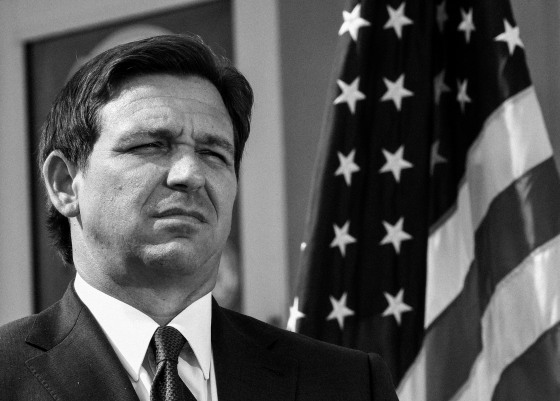Ron DeSantis is one of the most prominent Republican leaders skipping this year’s Conservative Political Action Conference. Perhaps the Florida governor is choosing instead to prepare for his upcoming visits to key primary states as part of an unofficial tour for his new book, which has the depressingly generic title “The Courage to Be Free.” While DeSantis’ absence from CPAC has made headlines, what’s absent from his book is far more telling. For a man who likes to pick his fights, the ones DeSantis avoids in his book are signposts for Democrats looking for weaknesses.
The least surprising omissions are the ones even DeSantis would probably recognize as politically inconvenient. For example, though he rails against elites helping elites, he doesn’t mention that he’s appointed some 250 donors to political posts. He does not repeat his tweet that “voting is a privilege,” not a right — a tweet he claims he didn’t write. He leaves out his early support for Covid vaccines — Florida’s millionth jab was aired live on “Fox and Friends” — and his later skepticism of such vaccines. (Last summer, Florida was the only state not to preorder vaccines for children under 5 years old.) In discussing his military service as a judge advocate general, he details his deployment to Iraq but not his time at Guantanamo Bay.
Oddly, given DeSantis’ obvious ambitions toward the Oval Office, foreign policy is almost absent from the book. It’s not as if print space was tight: DeSantis spends a dozen pages attacking critical race theory and crowing about a showdown with “60 Minutes” about Florida’s vaccine distribution. But Ukraine is never mentioned, China gets two pages and Russia is only named in the context of investigations into Donald Trump. Even when DeSantis recounts his efforts as a congressman to move the American Embassy in Israel to Jerusalem, his only takeaway is that the “so-called experts” who opposed him were wrong. (The definitions of “elite” and “expert” shift throughout DeSantis’ book, with the only consistent factor being people who disagree with him.) Not only is there no sign in his book of a “DeSantis doctrine,” there’s barely a sense that he’s thought about foreign policy at all.
More curious is DeSantis’ relative reticence on his immigration record. Given that the governor reached outside his state to inject himself into national headlines — sending state police to the Texas border and shipping migrants to Martha’s Vineyard in Massachusetts — you’d think DeSantis would tout these moves. But both stunts are missing from the book. The only part of his immigration record during his time as governor that he mentions is legislation banning sanctuary cities — even though it’s unclear if Florida had any "sanctuary cities" when the bill was signed. His decision not to mention those national stories doesn’t mean DeSantis has turned away from nativism. Just last month, DeSantis signed a bill expanding the migrant relocation program. But his omission of the stunts suggests he doesn’t believe they'll win with a national audience.
Immigration is just about the only GOP red meat that DeSantis leaves out in “The Courage to Be Free.” His war with Disney after the company opposed what critics call Florida’s “Don’t Say Gay” bill gets its own (sanitized) chapter. But the focus on culture wars drowns out issues that DeSantis will absolutely have to confront in a presidential race, not to mention in office. Neither Social Security nor Medicare rates a mention, even to rebut his past record of supporting cuts to both, and the national debt is only name-checked once. More broadly, there’s simply no sign that DeSantis has any type of economic plan.
In his first book, published in 2011, DeSantis railed against what he called Barack Obama’s “redistributive agenda.” In “The Courage to Be Free,” though, poverty is referred to only in passing, largely in the context of school choice. Missing are the typical conservative bromides about “pulling yourself up by your bootstraps.” So are misguided policies like work requirements. The term “middle class” is entirely absent; “working class” gets only a handful of mentions. When he does discuss jobs, it’s in the context of “protecting” them from pandemic restrictions. Under a President DeSantis, it seems, the economy’s fortunes, and those of everyday Americans, are left to wax and wane, while the commander in chief would concern himself with pressing issues like the war on Christmas.
Contrast DeSantis’ approach with that of his primary rival, former President Donald Trump. Both of their politics are awful in largely overlapping ways. But at least Trump’s plan included some elements that promised to improve Americans’ fortunes: renegotiating NAFTA, saving the coal industry and other ideas later shipwrecked on the rocks of his incompetence. While the former president pledges to “Make America Great Again,” DeSantis believes that America is already great, and just needs to be protected from liberal bureaucrats.
No wonder, then, that DeSantis does better with higher-income Republicans. If the 2024 election focuses on the grievance-a-thons playing out every day on right-wing media outlets, he’ll be comfortable. If his Republican opponents (and if he wins the nomination, his Democratic opponent) keep the focus on jobs and foreign policy or on culture issues favorable to Democrats such as abortion, DeSantis will have less to work with.
Though DeSantis brags that “the best defense is a good offense,” his record and his book suggest a largely reactive approach to politics. Even more so than Trump, DeSantis’ strategy is hugely dependent on what others — particularly the “legacy media” — are saying. And unlike Trump, who is so often his own worst enemy, DeSantis picks his fights deliberately. So the clashes he avoids are just as notable as those he relishes. For that reason alone, Democrats should read “The Courage to Be Free,” because his book — and what it’s missing — may provide a road map to his defeat.

